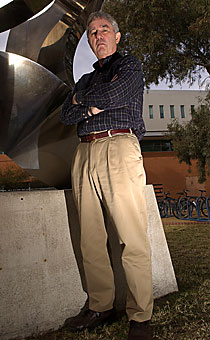 |
|
CHRIS CODUTO/Arizona Daily Wildcat
|
UA law professor Thomas Mauet teaches courses on evidence, trial advocacy and pretrial litigation. He also recently published a new book, "Trials: Strategy, Skills and the New Powers of Presentation," which comes on the 25th anniversary of his first book.
|
|
|
By Andrew O'Neill
Arizona Daily Wildcat
Wednesday, January 19, 2005
Print this
This is not your typical college classroom.
It has a witness stand, a jury box and a judge's bench. There are lawyers, jurors, witnesses and a judge ready to carry out their duties, but this is not an actual jury trial.
Welcome to professor Thomas Mauet's Basic Trial Advocacy class at the James E. Rogers College of Law. Mauet is the Milton O. Riepe Professor and director of Trial Advocacy at the law school, where he teaches courses on evidence, pretrial litigation and trial advocacy.
He has recently published a new book, "Trials: Strategy, Skills, and the New Powers of Presentation." It comes on the 25th anniversary of the publication of a popular textbook he wrote, "Trial Techniques," now in its sixth edition and widely used by law professors and trial attorneys across the nation.
"It took three years to do this book," he said.
Mauet's new book builds on the ideas and concepts contained in his first book includes cutting-edge research in the field of trial advocacy, a field that has changed significantly in the last 25 years since the publishing of his first book, he said.
He said the primary focus of trial advocacy is on jury trials and involves studying procedural law, evidence law and the persuasion of juries. His research attempts to answer a fundamental question in his field.
"What persuades juries to see it your way?" he said.
Mauet said jury trials are really about the psychology of persuasion, and the job of a trial lawyer is to sell ideas. He compares a trial lawyer's task to that of businesses marketing products to customers or politicians trying to sell their ideas to the public.
"I never get tired of finding more ways to be persuasive," he said.
Mauet said he wanted to write a book that would incorporate some of the latest research in the psychology of juries over the last two decades. He said most legal specialties are strictly about laws, but trials generally focus on people and psychology. They are fact oriented, and require a combination of logic and emotion, he said.
Mauet's expertise in the field of trial advocacy has come not only from many years of teaching and research, but also from the 10 years he spent as a trial attorney.
Mauet said it took him a while to decide he wanted to become a lawyer in the first place.
"I don't know any kid at age five who dreams of becoming a lawyer," he said.
Born in Germany and raised in Saratoga, N.Y., Mauet majored in history and government at Dartmouth College in New Hampshire.
By the time he graduated, he said he had decided not to pursue a career in medicine like his father, and he said the business world did not interest him either.
"I chose law school by default at first," he said.
He went on to law school at Northwestern University in Illinois, unsure of how it would work out. Mauet said he eventually came to appreciate the broad appeal of the law.
"As you get older, you realize that laws regulate a lot of human activity. It is an adult phenomenon," Mauet said.
After graduating from law school, Mauet spent the next 10 years as a trial attorney in Chicago.
"Doing trial work is fun. It's where the action is," he said.
He said he served as a county prosecutor, a federal prosecutor and as a commercial and tort lawyer at a private law firm during that time.
In 1980, he was offered a teaching position at the UA College of Law, where he continues to teach.
Teresa Krpata, a third-year law student who plans to pursue a career in criminal law after graduation, said Mauet's teaching is focused and direct, which she said she appreciates.
"He is very methodical and he explains things very clearly," Krpata said.
Krpata said she enjoys reading his books because they are written just like he teaches and Rene Alcoverde, a second-year law student said he agrees.
"He uses simple examples to illustrate concepts, and he doesn't bombard you with legalese," Alcoverde said.
Mauet said it usually takes students a while to get used to his classes, since they are used to discussing strictly legal issues.
He said the students who do well in his classes have good communication skills and are likable, and communicating effectively can persuade a jury in your favor.
"At its core, a trial is about psychology," he said.
